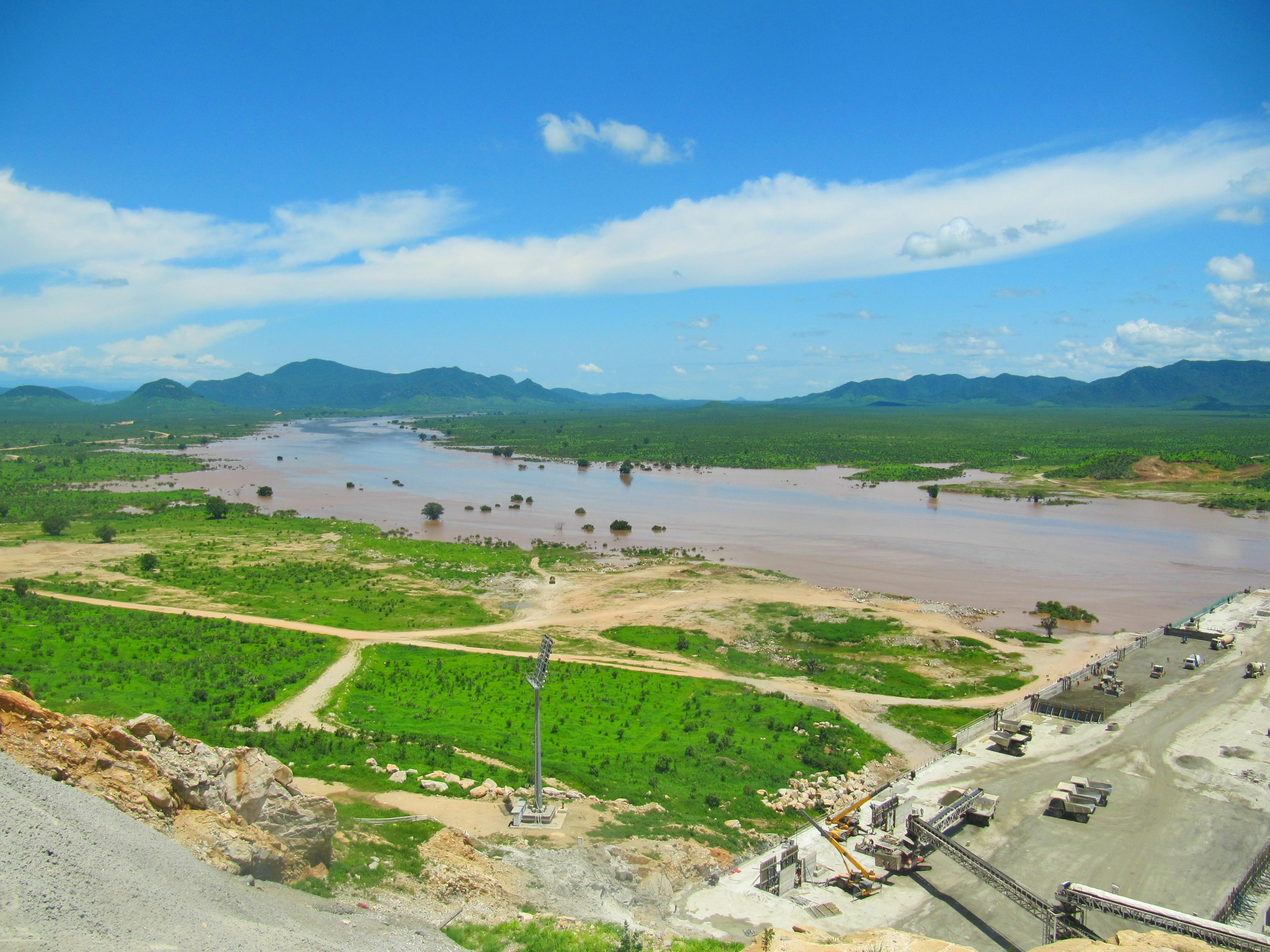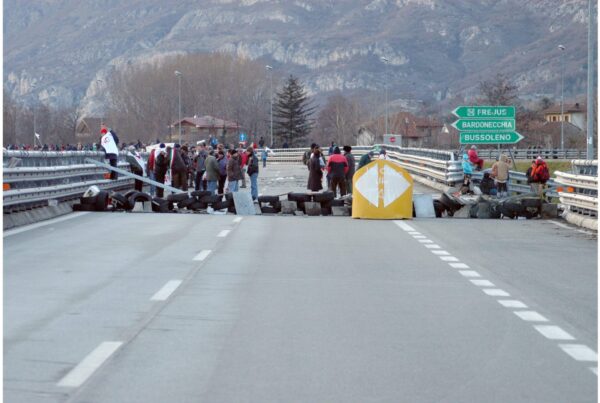By Emanuele Fantini, Filippo Menga and Ana Elisa Cascão
Tensions escalated recently between Ethiopia and Egypt around the construction of the Grand Ethiopian Renaissance Dam (GERD). In this controversy, the media is not only the space where the conflict publicly unfolds, but also one of the main players in shaping it. A few months ago, the authors started a conversation on these topics. Now, it continues here.

Construction site of the Grand Ethiopian Renaissance Dam (GERD), during a visit of 25 journalists from the Eastern Nile Basin. Photo credits: A.E. Cascão
Emanuele: At the end of October, I attended for the first time the Nile Basin Development Forum and I got surprised by the attention that the organisers – the Nile Basin Initiative – devoted to the media when discussing transboundary negotiations, projects and policies.
A few weeks later, at the time negotiations on the GERD between Ethiopia, Sudan and Egypt are in a deadlock, the media are among the main indicted. The Sudanese foreign Minister affirmed that “tension around the GERD is fabricated by the media”. The official voice of the Ethiopian government condemned “the distorted information which few Egyptian media outlets have disseminated”. Others are asking new narratives to overcome “a loud, unhinged media that spews out its unbalanced opinions at audiences hungry for information”.
I found intriguing to adopt a Gramscian perspective for analysing these issues. Why? Gramsci talks about “cultural hegemony” when referring to the role of “traditional organic intellectuals” – the media, but also the clergy, the military, the state bureaucracy or the teachers – and of “national-popular culture” in promoting and legitimising “hegemonic leadership”. He also points at how hegemonic discourses are linked to material and class interests.
My impression is that when it comes to the studies on hydro-hegemony, the role of popular culture, intellectuals and the media in crafting hegemonic discourses about national water security and in upholding specific economic interests, has not been sufficiently explored. Filippo, since you are among the co-authors of an assessment of ten years of studies on hydro-hegemony, what do you think?

The GERD is omnipresent in the Ethiopian media. Photo Credits: E. Fantini
Filippo: I think the times are ripe for a proper application of Gramsci to the Nile basin. Even though the setting that shaped Gramsci’s thinking (fascist Italy) has not much to do with transboundary waters, the ideas of the Sardinian philosopher can provide important insight.
Indeed, in the piece that you mention we assessed the impact of the hydro-hegemony scholarship on the study of transboundary water politics. With hindsight, we can clearly see how this critical approach to understanding transboundary water politics has been groundbreaking.
Most scholars now acknowledge the importance of ideas and discourses in determining the very material mechanisms through which transboundary waters are distributed and shared. Gramsci’s notion of hegemony – understood as force buttressed by consent – has helped to tease out the multifaceted impact of soft power in water negotiations.
And yet, Gramsci can also help us understand the intricate interrelation between domestic and international politics that is so important in water politics. Let us take, for instance, the Nile.
The river has a strong symbolic value and those who live near its waters perceive it (and rightly so) not only as a source of life, but also as a cultural heritage site around which an identity is formed.
In his writings about philosophy and Benedetto Croce, Gramsci discussed how humans cannot be detached from nature, as they are part of that same nature. And yet, at the same time, humans actively engage with nature through their work and intellectual activities.
If we understand humans as active relationships, or processes, the link between individuals and nature becomes central to understand broader relations in society and how these can lead to the creation of a collective consciousness.
It can be argued that there is not only one collective consciousness that operates around the Nile, but rather several ones. A study of the ways in which people living along the Nile have been engaging with it in popular culture, therefore, could further our understanding of how this international river can acquire relevance at the national level. Local perceptions of the river help explain national decisions about how the river is shared and managed. The GERD is a good example.
Ana Elisa: Since 2004 the London Water Research Group has been applying Gramsci to transboundary water relations, because we were interested in understanding how asymmetric power relations can determine the way things work in shared river basins.
The Nile appeared as a very interesting case, because only power – in its different forms, as Gramsci pointed out brilliantly – could explain how the most downstream riparian state is by far (and has always been) the main user of the Nile waters.
Popular culture has been crucial in putting the Nile at the top of the cultural-political agenda for more than a century, and it was key to legitimise the centuries-old belief that Egypt is the solely “gift of the Nile”.
As we speak, every single day an article, a lengthy report, a twitter or facebook entry, an opinion column from supporters or opposition, or a powerful political declaration is printed, aired or televised in Egypt.
The trend is also picking up quickly in Ethiopia. The last month was particularly prolific as the trilateral negotiations for the GERD were ‘declared’ stalled, and in the absence of precise information about what happened inside the negotiations room, speculations took over.
A manufactured frenzy, or a polemic that could have been avoided if science spoke louder than journalism? And where are the scientists? A recently launched book on “The GERD and the Nile Basin: Implications for Transboundary Water Cooperation” can help to answer some of the fundamental questions about the GERD.

Experts driving to the GERD. Photo credit: A.E. Cascão
Gramsci can be particularly useful also to analyse the role of experts and scientific knowledge. Is knowledge – technical, legal, economic, political, etc. – a tool that supports and drives policy-making processes? Do the experts (be it scholars or other informed members of civil society) have the ability and power to influence the debate, negotiations and decisions?
Scientific knowledge has been historically sanctioned and/or instrumentalised to serve entrenched interests and the maintenance of status quo frameworks. Are we witnessing a new era, where knowledge is growing increasingly influential and can potentially impact the political agenda towards a more effective, transparent and inclusive process of transboundary water management?
The experts are not yet – and perhaps will never be – ruling, but could we see them having a more crucial role in unveiling hidden political dynamics?
Emanuele: Experts, like the media, can be part of both the problem and the solution. I believe that a Gramscian approach to Nile issues goes beyond reflecting on the role of knowledge, culture and technology in legitimising hydro-hegemonic discourses.
It also implies working with other researchers, journalists, and water professionals to imagine and practice spaces for alternative narratives, challenging mainstream and hegemonic discourses based on the national interest. Our small contribution towards this direction would like to be a journal special issue on these topics. We are looking forward to more companions in this journey!
Emanuele Fantini is Lecturer at IHE Delft Institute for Water Education, where he coordinates the project “Open Water Diplomacy. Media, science and transboundary cooperation in the Nile basin” and hosts the podcast “The sources of the Nile” Email: [email protected] Twitter: @emanufanti
Filippo Menga is a Lecturer in Human Geography at the University of Reading, where he carries out interdisciplinary research exploring the interplay between humans and water. He is the author of Power and Water in Central Asia (Routledge), and co-editor (with Erik Swyngedouw), of Water, Technology and the Nation-State (Earthscan). Email: [email protected] Twitter: @filippomenga
Ana Elisa Cascão is an independent consultant and researcher, and she has been working on hydropolitics in the Nile Basin for almost 15 years. She has numerous publications, including the multi-author book “The GERD and the Nile Basin: Implications for Transboundary Water Cooperation”, launched in October 2017. Email: [email protected] Twitter: @anacascao






Reblogged this on Political Ecology Network.